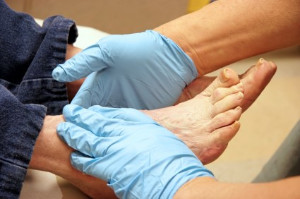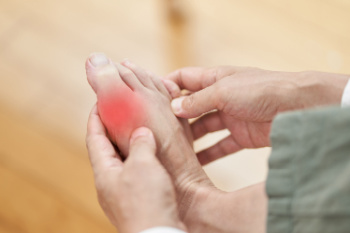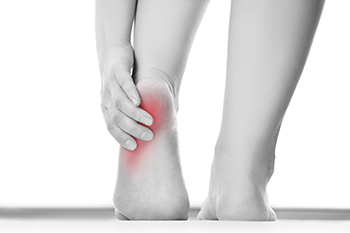Blog
Items filtered by date: June 2025
Caring for Diabetic Feet Starts with Everyday Awareness

Diabetes can affect how the feet feel, heal, and function, which is why they need daily attention. Numbness may prevent small injuries from being noticed, and reduced blood flow can slow healing. Simple steps like inspecting feet each day, wearing properly fitted shoes, and keeping the skin clean and moisturized help lower the risk of complications. Gentle nail care and avoiding walking barefoot are also key. Staying active supports circulation, and keeping blood sugar levels in range helps protect nerves and tissues. Despite careful routines, changes can still happen. Signs such as lingering sores, unusual redness, or sudden discomfort deserve professional attention. If your feet are showing new or concerning symptoms, it is suggested that you schedule an appointment with a podiatrist for a diagnosis and appropriate treatment.
Diabetic foot care is important in preventing foot ailments such as ulcers. If you are suffering from diabetes or have any other concerns about your feet, contact one of our podiatrists from South Jersey Foot & Ankle Institute. Our doctors can provide the care you need to keep you pain-free and on your feet.
Diabetic Foot Care
Diabetes affects millions of people every year. The condition can damage blood vessels in many parts of the body, especially the feet. Because of this, taking care of your feet is essential if you have diabetes, and having a podiatrist help monitor your foot health is highly recommended.
The Importance of Caring for Your Feet
- Routinely inspect your feet for bruises or sores.
- Wear socks that fit your feet comfortably.
- Wear comfortable shoes that provide adequate support.
Patients with diabetes should have their doctor monitor their blood levels, as blood sugar levels play such a huge role in diabetic care. Monitoring these levels on a regular basis is highly advised.
It is always best to inform your healthcare professional of any concerns you may have regarding your feet, especially for diabetic patients. Early treatment and routine foot examinations are keys to maintaining proper health, especially because severe complications can arise if proper treatment is not applied.
If you have any questions, please feel free to contact our office located in Mullica Hill, NJ . We offer the newest diagnostic and treatment technologies for all your foot care needs.
Understanding Painful Gout

Gout is a form of arthritis that causes sudden, severe pain in the joints, most commonly in the big toe. It occurs when uric acid builds up in the blood, forming sharp crystals in the joints. This condition is often triggered by factors like a diet high in purines, which are found in red meat, seafood, and alcohol. Other risk factors include dehydration, obesity, or a family history of gout. Symptoms of gout include intense pain, swelling, redness, and warmth in the affected joint, often making even the light touch of a blanket unbearable. Attacks typically occur at night and can last for several days. A podiatrist can diagnose gout by evaluating your symptoms, performing a physical examination, and ordering blood tests or joint fluid analysis to check uric acid levels. Treatment options include medication to reduce inflammation, pain management, dietary recommendations, and lifestyle changes to prevent future flare-ups. If you have painful gout, it is suggested that you are under the care of a podiatrist.
Gout is a foot condition that requires certain treatment and care. If you are seeking treatment, contact one of our podiatrists from South Jersey Foot & Ankle Institute. Our doctors will treat your foot and ankle needs.
What Is Gout?
Gout is a type of arthritis caused by a buildup of uric acid in the bloodstream. It often develops in the foot, especially the big toe area, although it can manifest in other parts of the body as well. Gout can make walking and standing very painful and is especially common in diabetics and the obese.
People typically get gout because of a poor diet. Genetic predisposition is also a factor. The children of parents who have had gout frequently have a chance of developing it themselves.
Gout can easily be identified by redness and inflammation of the big toe and the surrounding areas of the foot. Other symptoms include extreme fatigue, joint pain, and running high fevers. Sometimes corticosteroid drugs can be prescribed to treat gout, but the best way to combat this disease is to get more exercise and eat a better diet.
If you have any questions, please feel free to contact our office located in Mullica Hill, NJ . We offer the newest diagnostic and treatment technologies for all your foot care needs.
See Your Foot Specialist Regularly If You Work On Your Feet
Managing Heel Pad Syndrome

Heel pad syndrome, also known as fat pad atrophy, occurs when the thick layer of fatty tissue beneath the heel thins out, reducing its ability to absorb shock. This can lead to deep, aching heel pain that worsens with prolonged standing or walking. Common causes of heel pad syndrome include age-related degeneration, obesity, repetitive impact activities, wearing improper footwear, and prior heel injuries. People who walk barefoot on hard surfaces may place additional stress on the heel, increasing the risk of pain. A podiatrist can evaluate heel pad function and recommend appropriate treatment to relieve pressure on the heel. Supportive orthotics and well-cushioned footwear can help reduce discomfort during daily activities. In addition, specific exercises, such as calf stretches, heel raises, and ankle range-of-motion movements, are often used to improve foot control and reduce stress on the heel. If you are suffering from heel pain, it is suggested that you schedule an appointment with a podiatrist for an exam, diagnosis, and proper treatment.
Many people suffer from bouts of heel pain. For more information, contact one of our podiatrists of South Jersey Foot & Ankle Institute. Our doctors can provide the care you need to keep you pain-free and on your feet.
Causes of Heel Pain
Heel pain is often associated with plantar fasciitis. The plantar fascia is a band of tissues that extends along the bottom of the foot. A rip or tear in this ligament can cause inflammation of the tissue.
Achilles tendonitis is another cause of heel pain. Inflammation of the Achilles tendon will cause pain from fractures and muscle tearing. Lack of flexibility is also another symptom.
Heel spurs are another cause of pain. When the tissues of the plantar fascia undergo a great deal of stress, it can lead to ligament separation from the heel bone, causing heel spurs.
Why Might Heel Pain Occur?
- Wearing ill-fitting shoes
- Wearing non-supportive shoes
- Weight change
- Excessive running
Treatments
Heel pain should be treated as soon as possible for immediate results. Keeping your feet in a stress-free environment will help. If you suffer from Achilles tendonitis or plantar fasciitis, applying ice will reduce the swelling. Stretching before an exercise like running will help the muscles. Using all these tips will help make heel pain a condition of the past.
If you have any questions, please feel free to contact our office located in Mullica Hill, NJ . We offer the newest diagnostic and treatment technologies for all your foot care needs.
Symptoms That May Point to Morton’s Neuroma

Morton’s neuroma affects the nerve between the toes, most often between the third and fourth toes. It usually develops from repeated pressure or irritation, leading to thickening of the nerve tissue. People with this condition often describe a burning or tingling sensation in the ball of the foot, sometimes with numbness in the toes. Many say it feels like a pebble is stuck in their shoe or that their sock is bunched up. The pain may come and go, becoming worse with wearing tight shoes or long periods of walking. In early stages, removing the pressure may help, but in more advanced cases, help from a podiatrist is often needed. If you have persistent forefoot pain or unusual sensations between your toes, it is suggested that you see a podiatrist for a proper diagnosis and appropriate treatment.
Morton’s neuroma is a very uncomfortable condition to live with. If you think you have Morton’s neuroma, contact one of our podiatrists of South Jersey Foot & Ankle Institute. Our doctors will attend to all of your foot care needs and answer any of your related questions.
Morton’s Neuroma
Morton's neuroma is a painful foot condition that commonly affects the areas between the second and third or third and fourth toe, although other areas of the foot are also susceptible. Morton’s neuroma is caused by an inflamed nerve in the foot that is being squeezed and aggravated by surrounding bones.
What Increases the Chances of Having Morton’s Neuroma?
- Ill-fitting high heels or shoes that add pressure to the toe or foot
- Jogging, running or any sport that involves constant impact to the foot
- Flat feet, bunions, and any other foot deformities
Morton’s neuroma is a very treatable condition. Orthotics and shoe inserts can often be used to alleviate the pain on the forefront of the feet. In more severe cases, corticosteroids can also be prescribed. In order to figure out the best treatment for your neuroma, it’s recommended to seek the care of a podiatrist who can diagnose your condition and provide different treatment options.
If you have any questions, please feel free to contact our office located in Mullica Hill, NJ . We offer the newest diagnostic and treatment technologies for all your foot care needs.


